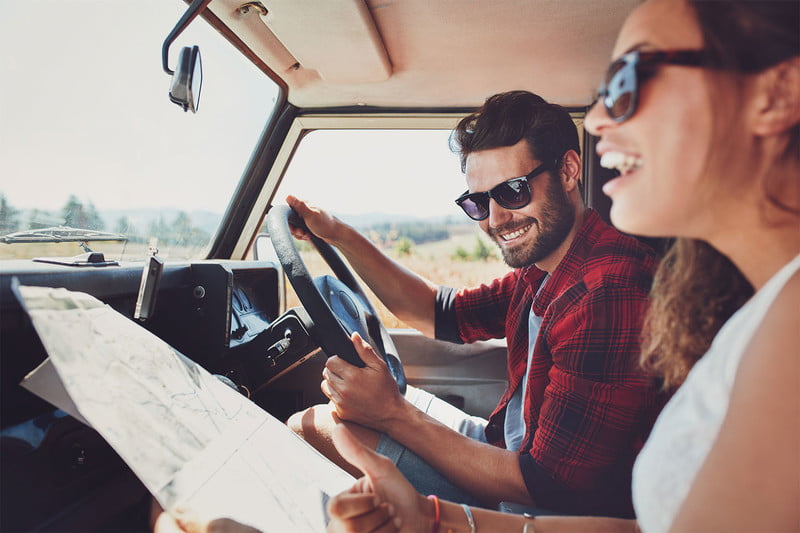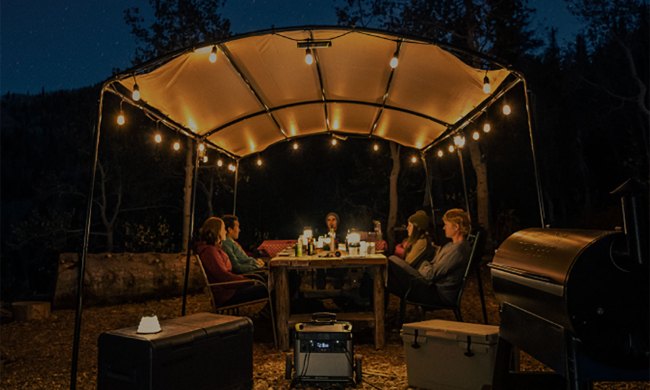
Seeking socially-distant ways to get out of the house after months of quarantine, families, couples, and solo travelers are piling into cars, RVs, and campers to hit the road, regain some semblance of normalcy for a short time, and reconnect with nature.
Along with the cheap tchotchkes bought at roadside stops; pictures of hiking, fishing, and barbecuing; and happy memories, there is another souvenir we all bring back from a trip: A carbon footprint. No one wants to think about the fact that their much-looked-forward-to annual trip harms the environment and the places they visit, but it does. And although driving a car has less environmental impact than flying, it still leaves a mark. It’s not just the gas emissions — there’s all the trash that’s produced from weeks on the road, too. But with a little advanced planning, there are numerous ways to make your road trip more sustainable. Here are some of the best ways to have a sustainable, eco-friendly road trip this 2022.
Pack Light and Smart
Weighing down your car with tons of luggage will reduce its efficiency and use up fuel faster, requiring more stops at gas stations. So be smart with your packing, and only pack the essentials while keeping things tight and efficient.
Brings Reusable Water Bottles
This may seem like a no-brainer, but you’d be surprised how often it’s the smallest things that get forgotten at home. Bringing along reusable water bottles eliminates the need to constantly buy single-use water bottles at gas stations and grocery stores along the way. Plus, it’s healthier for you. Plastic water bottles left in warm cars can leach dangerous chemicals into the water. So make sure that reusable bottles are at the top of your do-not-forget list!
Get Your Car Tuned Up
Another way to keep fuel costs and gas stops to a minimum is by making sure your car is tuned up and in tip-top shape before heading out. That means checking and tuning up the engine, ensuring that your tires are inflated to the correct pressure, and making sure that the gas cap screws on properly (missing or broken gas caps reduce fuel efficiency and release harmful fumes from your tank into the air). So give your vehicle a good checkup before heading out, and it will help both you and the environment.
Use Cruise Control
Make your gas last longer and take you farther by engaging cruise control while out on the highway, maintaining a steady, constant speed that will maximize your fuel consumption. Fewer fuel fill-ups mean fewer harmful emissions being sent out into the air.
Plan Your Route in Advance
I know it’s not as fun as just hitting the road with a destination in mind and seeing where the highway takes you, but going on long-winded detours or constantly having to backtrack adds up to more fuel and emissions. Mapping and plotting your route in advance will save you gas and limit emissions.
Pack Reusable Bags and Containers
When you’re on a road trip, you’re constantly stopping in stores to pick up supplies, eating at diners and restaurants, and doing some fun souvenir shopping from time to time. All those plastic bags and to-go containers add up, so just make sure to bring your reusable bags to the grocery store. Don’t forget to bring them along on your road trip as well. That goes for food and storage containers, too — less to-go styrofoam containers in landfills!

Pack Snacks and Food Ahead of Time in Reusable Bags and Boxes
I know, I know — there are few things more emblematic of a classic road trip than pulling into a gas station, heading into the store, and walking out with an armload of junk food for the road. But if you’re trying to be more aware of your impact while traveling, those snack hauls have to be a thing of the past. For each snack stop, that’s an armload of garbage going into a landfill. But that’s not to say you can’t still have your favorite treats while on the road! Buy them in advance before leaving and package them in reusable containers for easy, eco-friendly, on-the-go snacking. And the same goes for food and meal prep. Plan and buy ingredients in bulk for some of your meals in advance and pre-package them so you don’t have to purchase single-use bags and containers of food while on the road as much.
Don’t Idle
During road trips, there are frequent occasions to idle the car for a few minutes here and there — stopping at a scenic viewpoint to admire the vista or going through the drive-through, for example. Previously, it was believed that this was better than stopping and restarting your car, as the ignition produced more emissions, but that’s no longer the case with modern cars. So idling should be a thing of the past. Take the time, stop your car, get out, and enjoy that view properly.
Recycle and Be Responsible with Your Trash
You’re traveling in new and unfamiliar territory. You have places to go, things to do. Trying to find a local recycling center is probably not as high on your list of priorities as going for that hike or tubing down a river with a cold beer in hand. But even when on the road, you should still take the time to dispose of your garbage properly and recycle things that can be recycled. A few minutes spent doing this means less waste in landfills. Take the time to separate your recyclables, and look online to seek out places to recycle along your route. And always dispose of your garbage properly.
Leave No Trace, and Pick Up After Yourself and Others
Once again, this one feels like a no-brainer, but it bears repeating: Leave each place you’re visiting better than you found it. Always pick up after yourself and, if you encounter litter or garbage, pick it up to dispose of it properly as well. Follow the tenets of the Leave No Trace movement and be responsible stewards while road tripping.
Offset Your Trip
All of the above are good ways to reduce your emissions and waste during the trip, but if you truly want to go the extra mile and make your trip as sustainable as possible, you can pay to offset the emissions produced by your vehicle. Websites like Terrapass, MyClimate, and Mossy Earth have tools to help you calculate your emissions from a trip and then pay a fee to have those emissions offset through restoration and conservation projects like planting native trees and investing in renewable energy initiatives. Offset costs are also often very reasonable, so it’s easy to factor them into a trip budget.



